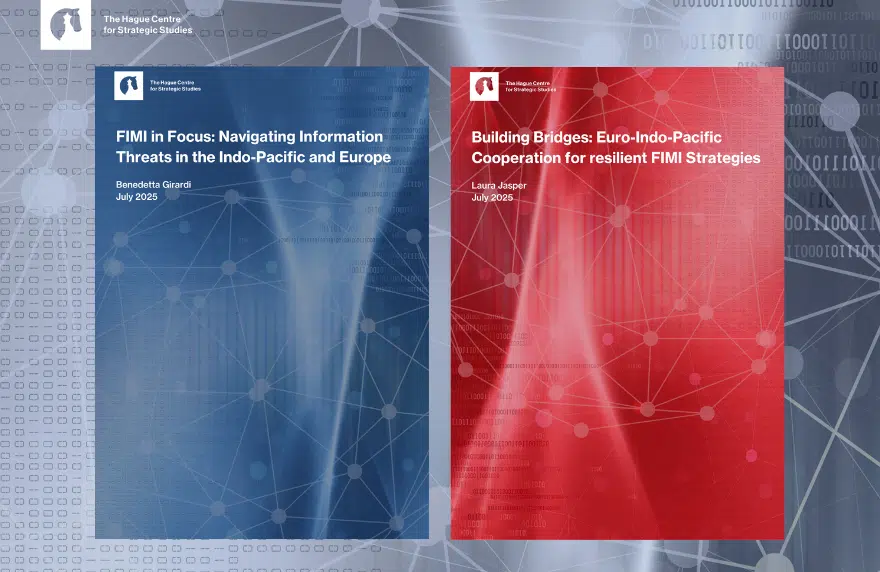From Europe to the Indo-Pacific, foreign actors are manipulating information to divide societies and undermine democracy. As disinformation knows no borders, why are the two regions still fighting the growing menace of Foreign Information Manipulation and Interference (FIMI) alone? In two new HCSS policy briefs, strategic analysts Benedetta Girardi and Laura Jasper provide a comprehensive overview of the FIMI threat landscape across the two regions, and explore how to move from shared concern to shared action for resilient FIMI Strategies.
Policy Brief 1 | FIMI in Focus: Navigating Information Threats in the Indo-Pacific and Europe
FIMI poses an evolving and systemic threat to democratic institutions and societal cohesion in both the Indo-Pacific and Europe. This first policy brief by Benedetta Gorardi provides a comprehensive overview of the FIMI threat landscape across the two regions, identifying shared vulnerabilities, common tactics, and the unique regional contexts that shape how these threats manifest.
Key Takeaways:
- Shared vulnerabilities, shared targets: Despite geographic and political differences, both Europe and the Indo-Pacific face the same FIMI vulnerabilities—fragmented media, low trust, and digital exploitation.
- It’s not just about who—it’s about how: China and Russia use different narratives but similar playbooks. Policy should focus on disrupting the mechanisms of manipulation, not just identifying actors.
- Terminology matter: Without a shared vocabulary on what FIMI is, the EU-Indo-Pacific cooperation is stunted. Standardizing definitions is step one toward coordinated response.
- FIMI thrives where trust is weak: A whole-of-society approach—engaging government, media, academia, civil society, and industry—is essential to strengthen digital resilience. Empowered citizens are the first line of defence.
Read the full Policy Brief here:
Policy Brief 2 | Building Bridges: Euro-Indo-Pacific Cooperation for resilient FIMI Strategies
FIMI has emerged as a pressing and complex challenge to democratic resilience across both Europe and the Indo-Pacific. This second policy brief by Laura Jasper explores how Europe and the Indo-Pacific can strengthen cross-regional cooperation to enhance resilience against FIMI. It examines regional policy frameworks and national responses, revealing divergent approaches.
Key Takeaways:
- FIMI is escalating across both regions, targeting elections, institutions, and trust itself.
- Despite similar threats, Indo-Pacific and European responses diverge—liberal vs. illiberal models complicate coordination.
- Cooperation exists but is scattered — opportunities lie in aligning terminology, frameworks, and strategic dialogues.
- A whole-of-society, multi-stakeholder response is critical, involving government, civil society, media, and industry.
Read the full Policy Brief here:
This research was made possible through a financial contribution from the Embassy of Australia in the Netherlands to the Hague Centre for Strategic Studies (HCSS). Responsibility for the contents and for the opinions expressed, rests solely with the authors.
Authors: Benedetta Girardi and Laura Jasper, with contributions by Timur Ghirotto and Davis Ellison.





